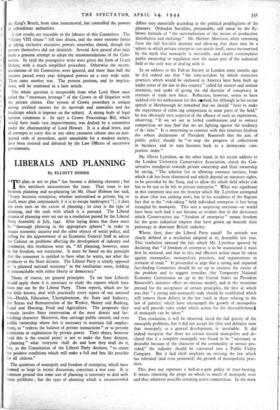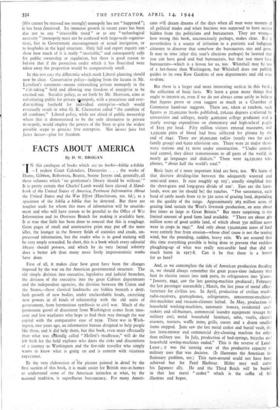LIBERALS AND PLANNING
By ELLIOTT DODDS "MO plan or not to plan" has become a debating chestnut ; but this antithesis misconstrues the issue. That issue. is not between planning and no-planning (as Mr. Oscar Hobson has said, "Every business enterprise, whether nationalised or private, big or small, must plan continuously if it is to escape bankruptcy"); it does not even turn on the extent of planning ; its crux is the type of planning, and the ends with which it is pursued. The Liberal criteria of planning were set out in a resolution passed by the Liberal Party Assembly in July, 1942. After laying down that there must be "thorough planning in the appropriate spheres" in order to ensure economic security and the other objects of social policy, and calling for the appointment of an Economic General Staff to advise the Cabinet on problems affecting the development of industry and commerce, this resolution went on, "All planning, however, must be for freedom, not restriction. It must be based on the principle that the consumer is entitled to have what he wants, not what the producer or the State dictates. The Liberal Party is utterly opposed to 'a planned national economy' in the totalitarian sense, holding it irreconcilable with either liberty or democracy."
These, of course, are general principles. To see how Liberals would apply them it is necessary to study the reports which have been put out by the Liberal Party. These reports, which are far too little known, deal with practically every aspect of our national life—Health, Education, Unemployment, the State and Industry, the Status and Remuneration of the Worker, Money and Banking, Land and Housing, Food and Agriculture. The proposals they contain involve State intervention of the most drastic and far- reaching character. Moreover, they envisage public control, and even public ownership where this is necessary to maintain full employ- ment, to "redress the balance of private transactions" or to prevent restriction or exploitation by private power. Their object, however (and this is the crucial point) is not to make the State dictator, " planning " what everyone shall do and how they shall do it, but, as the Constitution of the Liberal Party declares, "to create the positive conditions which will make a full and free life possible for all citizens."
The questions of monopoly and freedom of enterprise, which have loomed so large in recent discussion, constitute a test case. It is common ground that some sort of planning is necessary to deal with these problems ; but the type of planning which is recommended differs very materially according to the political predilections of the planners. Orthodox Socialists, presumably, still swear by the fly- blown formula of "the nationalisation of the means of production, distribution and exchange." Mr. Herbert Morrison, while retreating from the full Socialist doctrine and allowing that there may be a ' sphere in which private enterprise can justify itself, seems mesmerised by the myth that monopoly is inevitable, and clearly contemplates public ownership or regulation over the major part of the industrial field as the only way of deal:ng with it.
In an address to the Fab:an Society in London some months ago he d:d indeed say that "the semi-accident by which restrictive practices which would be outlawed in America have been built up under cover of the law in this country" called for earnest and zealous attention, and spoke of giving the old doctrine of conspiracy in restraint of trade new force. Reflection, however, seems to have sicklied o'er his enthusiasm for this rarthod, for although in his recent speech at Mexborough he remarked that we should "have to make the experiment of enfot :ing competition in some parts of the field," he was obviously very sceptical of the efficacy of such an experiment, observing, "If we set out to forbid combination and to enforce competition we may find that we are fighting against the tendency cf th r time." It is interesting to contrast with this timorous fatalism the robust declaration of President Roosevelt that the aim ol public policy, should be "to stop the progress of collectivism in business and to turn business back to a democratic com- petitive order."
Mr. Oliver Lyttelton, on the other hand, in his recent address to the London University Conservative Association, stated the Con- servative standpoint towards private ownership and State ownership by saying, "The solution lies in allowing common services, from which risk has been eliminated and which depend on statutory rights, to be provided by the State, and to allow the whole field where risk has to be run to be left to private enterprise." What was significant in this statement was not the frontier which Mr. Lyttelton attempted.
to draw (that was nothing new), but in his avoidance of the flagrant fact that in the " risk-taking " field individual enterprise is fast being
strangled by monopoly. This was a surprising omission—or would have been such had it not become so evident that in the dictionary which Conservatives use "freedom of enterprise" means freedom for the great industrial empires that have .grown up beneath their patronage to dominate British industry.
Where, then, does the Liberal Party stand? Its attitude was clearly defined in a resolution adopted at its Assembly last year.
This resolution stressed the fact which Mr. Lyttelton ignored by declaring that "if freedom of enterprise is to be maintained it must first be restored, and that to this end effective action must be taken against monopolies, monopolistic practices, and organisations in restraint of trade." It proceeded to urge that a strong and impartial fact-finding Committee should be set up to examine the extent of the problem and to suggest remedies (the Temporary National Economic Commission set up in the United States on President Roosevelt's initiative offers an obvious model), and in the meantime pressed for the acceptance of certain principles, the first of which was that "a strong anti-monopoly code should be established which will remove those defects in the law -(such as those relating to the law of patents) which have encouraged the growth of monopolies and will provide rules under which action for the disestablishmelt of monopoly can be taken."
This resolution, it will be observed, faced the full gravity of the monopoly problems, but it did not accept the false and defeatist view that monopoly, as a general development, is inevitable. It did indeed recognise that there are certain natural monopolies and de- clared that if a complete monopoly was found to be "necessary or desirable because of the character of the commodity or service pro- vided," the industry should be converted into a Public Utility Company. But it laid chief emphasis on revising the law which has tolerated (and even promoted) the growth of monopolistic prac- tices.
This does not represent a bull-at-a-gate policy of trust-busting. It means removing the props on which so much of monopoly rests and thus wherever possible restoring active competition. In the main (this cannot be stressed too strongly) monopoly has not " happened"; it has been Contrived. Its immense growth in recent years has been due not to any "irresistible trend" or to any "technological necessity" (monopoly must not be confused with large-scale organisa- tion), but to Government encouragement or actual instigation, or to loopholes in the legal structure. Only full and expert inquiry can - show how much of it is really "inevitable," and consequently calls for public ownership or regulation, but there is good reason to believe that if the protection under which it has flourished were taken away the proportion would be comparatively small.
In this test case the differentia which mark Liberal planning should now be clear. Conservative policy--judging from the lacuna in Mr. Lyttelton's statement—means entrenching private monopoly in the " risk-taking " field and allowing true freedom of en.terprise to be crushed out. Socialist policy, as set forth by Mr. Morrison, aims at substituting public for private rirnopoly, with a precarious and ever- dim;nishing foothold for individual enterprise—which would eventually result in what G. K. Chesterton called "the combine of all combines." Liberal policy, while not afraid of public Ownership where this is demonstrated to be the only alternative to private monopoly, would employ the powers of the State to give the widest possible scope to genuine free enterprise. Not laissez faire but faites laisser—plan for freedom.



























 Previous page
Previous page